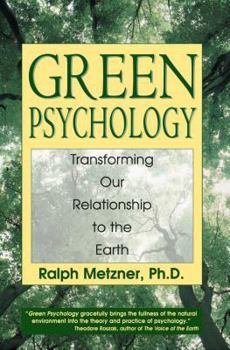Green Psychology: Transforming Our Relationship to the Earth
A visionary ecopsychologist examines the rift between human beings and nature and shows what can be done to bring harmony to both the ecosystem and our own minds. * Shows that the solution to our ecological dilemma lies in our own consciousnesses. It is becoming more and more apparent that the causes and cures for the current ecological crisis are to be found in the hearts and minds of human beings. For millennia we existed within a religious and...
Format:Paperback
Language:English
ISBN:0892817984
ISBN13:9780892817986
Release Date:June 1999
Publisher:Park Street Press
Length:240 Pages
Weight:0.90 lbs.
Dimensions:0.6" x 6.1" x 9.0"
Customer Reviews
4 ratings
Psychedelics and Evolutionary Consciousness
Published by Thriftbooks.com User , 18 years ago
Great book! Metzner writes of the first original world of the tribal indigenous society that living in harmony with nature and the earth for thousands of years in appreciation and religious sacredness of divinity in all life and matter. Responsible and healing use of herbs and psychedelics were used to create peace and higher understandings of spirituality. In this Metzner looks at the various Gaia theories and the human connection to the earth, the spirits of nature, the world tree metaphor and the 4 elements in spiritual and ritual. He then relates a personal vision quest he had partaken and next goes into the "Green" mystical visions of 12th century Abbess Hildegard von Bingen. There is emphasis put on psychedelics as Gnostic catalysts, evolving consciousness to see beyond polarities, as a possible evolutionary instrument towards wider awareness beyond cultural, religious, societal-economic filters to the integral systems of transformation, including shamanism, alchemy and yoga. Thoughts are presented on the human-nature alienation of ecology from the mechanistic science of Western civilization and its harmful reductionism to our psyches (Shepard's ontogenetic crippling) and our environment, in loss of adolescent initiation rites, in autism or crippling compartmentalization, in addictions to consumerism, in narcissist self elevations, and amnesia from past evolutionary traumatic events. Also brought out are the historical roots of mechanistic science, humanism, Protestantism, colonialism and are need to move towards reconsidering polytheistic animism, seeing the sacredness in all life and the mundane; how the assault of paganism in the ancient sky gods attack on the earth goddess religious cultures, using various myths depicting acceptance, rejection and assimilation.
Green Psychology
Published by Thriftbooks.com User , 21 years ago
This book is wonderful and outlining man's relationship with nature. I found it especially helpful while also reading the poetry of William Wordsworth, who holds the man/nature relationship in high esteem. I have already taken pages of notes while reading this and will certainly incorporate some of it into my personal philosophy (especially the materialism chapter... there are hints at Buddhism throughout the book). A great read for any nature or psychology enthusiast. Word Ninja
A Worthy Compilation--but not a Coherent Work
Published by Thriftbooks.com User , 23 years ago
Each chapter in this book has a different emphasis. Each one stands alone and independent. The chapters span a wide range of subjects, from ecopsychology, to natural entheogens (teacher plants, which induce an altered state of consciousness useful for spiritual journeying). He begins with an account of his visit with the Lacandones and experience of their Balche, an entheogenic drink. His next chapter uses depth psychology to analyze the Gaian hypothesis. He then describes a vision quest experience in the Mojave Desert before moving on to a discussion of the Veriditas of Hildegard von Bingen, a 12th century mystic. He examines the role of entheogens, then broaches the subject of the psychopathology of the human-nature relationship--also examining the dissociative split within human consciousness between the spiritual and the natural. He goes back in time to contrast the Indo-Kurgan "sky gods" with the matrifocal cultures and their earth deities. He peeks at the wild deities of animistic and shamanic cultures, and then considers how the reunification of the sacred and the natural could impact both individuals and society. He shows how our current situation demands that we move to an ecological world view. Finally, he concludes with a chapter which demands that we root ourselves in our bioregions, commenting that our identity is not simply the ego baggage we have acquired, but that we also identify as beings who exist in a place. Without the stories of our "places," we are set adrift, and cannot forge a sacred union with the Natural.
Alarm Call
Published by Thriftbooks.com User , 24 years ago
I was a bit slow getting started reading this book, but once I began in earnest I got fascinated. It is a systems view of Man and the Environment, asking the hard questions and proposing answers from the psychologists (and common sense) point of view. There is so much management and operations management which is done without regard for the important constraints of the problem, it is getting out of hand. Can industries exist and produce without ruining the earth which supports them? Is there such a thing as a sustainable telecommunications system? Better ask these questions, and answer them, before it is too late.





